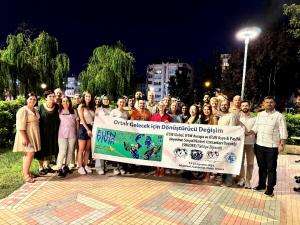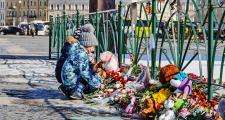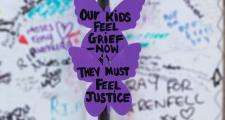After the Earthquakes
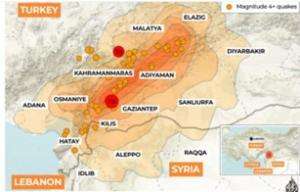
On February 6th 2023 a huge area in Southern Turkey (now Turkiye) and North West Syria was hit by two earthquakes measuring 7.8 and 7.6 in magnitude.
Each lasted just a minute but with the help of aftershocks, they destroyed at least 300,000 buildings across 11 Provinces, devastating vital infrastructure, businesses, farms, homes, schools, hospitals and heritage. Over 55000 people were killed, mostly in Turkiye, and hundreds of thousands more injured. The most intense and widespread damage was in the province of Hatay on the border of Syria and the Mediterranean where 80 per cent of buildings collapsed or were demolished.
Turkiye is part of the European Region of the International Federation of Social Workers (IFSW ). In my role as President of IFSW Europe I visited the country this August with Rory Truell, IFSW global secretary general, and Machiko Ohara, President of IFSW Asia Pacific Region. We were invited and hosted by the Turkish Association President Ramazan Yuksel and his colleagues from Ankara, Istanbul and the earthquake zones. Travelling with different colleagues on different parts of the journey, we learnt a huge amount about the disaster, the political and practical response to it, and about the brave positivity and adherence to core social work values that Turkish social workers have brought to this challenge across a vast swathe of their country.
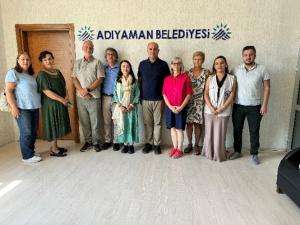
The trip included visiting projects funded through IFSW donations, particularly from the Japanese and South Korean associations. On behalf of IFSW donors, Rory, Machiko and I explored the social work approaches in the funded projects. We discussed how learning can be shared from the experiences of social workers in major disasters across the world.
The scale of the damage and grief from the Turkish quakes is startling. 2.4 million people were made homeless and still today over 760,000 (including 250,000 children) remain in ‘container cities’ – clusters of temporary, three-room (including the bathroom) micro-dwellings created out of metal shipping containers, often allocated to households irrespective of the size of the family.
We visited the container cities where the IFSW social work projects are based in Adiyaman and Hatay. Rows of stark and anonymous containers baking in the 40 degree heat are one of the most visible signifiers of what we were told repeatedly; the ‘emergency’ stage of the earthquakes is really not over. Yet many of the humanitarian aid agencies and donors have moved on and international attention is elsewhere.
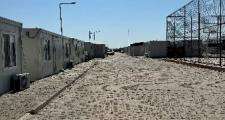
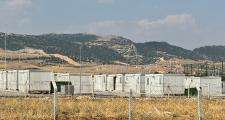
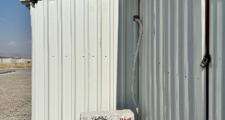
Social workers, both municipally employed and funded through IFSW, bring humanising, personalised and ongoing support and presence to the people stuck and often lonely in the containers, dislocated from previous communities and neighbours which were destroyed in the quake.
We visited a Roma family of a mother and four children supported by the IFSW funded project. They rented a house in the countryside before the quake where they grew their own food and had space. Now they live in a container. While the children can go to school, there is nowhere to go and nothing to do for the rest of the time.
Container dwellers have free electricity and water - and air conditioning in the 40 degree heat - but no transport links, no nearby social or shopping facilities, no suitable play areas and the route out and into permanent housing for thousands of people is unclear or unaffordable.
The national government response to the quakes has been inadequate, rebuilding is too slow and unplanned, and access to new housing is unequal. Clusters of identical apartment blocks are springing up on hillsides around the demolished city centres, without greenery for shade and cooling and without amenities. And they are not affordable to many. Moving out of the free container accommodation means taking on rents and bills that are high given pay rates, the lack of work in the region and very high inflation.
Many of the social workers we met were from and were still living in the earthquake zone and were themselves survivors of losses, grief and hardship. They talked to us about what life was like there now. Once of our travelling companions from Ankara had lost her mother-in-law in the quake. Now not only has she gone, but the community, the townscape, the place her husband’s family were from has been erased.
In the towns of Hatay and Adiyaman, demolition and rebuilding is continuous through the night, but this creates hazardous particulate air pollution including materials such as asbestos, and a lot of noise. Social workers spoke to us of their concerns about the physical and mental health of their children growing up in this and they were aware of the secondary environmental issues being created by the building techniques being used.
As always in this situation, people living the most precarious and impoverished lives pre-earthquake are being left further behind in the aftermath. Social workers are bringing their distinctive skills to support these children and adults, providing psycho-social support, practical help, access to health services and help with rehousing.
We ended our journey meeting with social workers from across Turkiye in Ankara. We were able to reflect on our experience and find out more from their differing perspectives. We ended by reflecting on how social workers, acting together and in solidarity with each other, could start to work more collaboratively with the communities in the earthquake zones to move beyond needs assessment and provision of services to empowering people to start taking back a control and using their strengths. Where people start to find their own solutions, even in terrible circumstances, they can often accelerate their progress and move beyond the hopelessness of loss and unfathomable changes. This is for further discussions and work between IFSW and the Turkish association.
I was deeply impressed by the professionalism, motivation and solidarity of our social work colleagues in Turkiye and I look forward to working with them in coming months and years.
